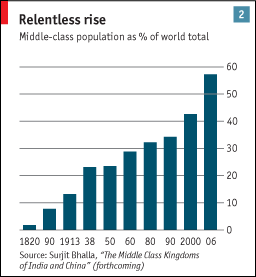Worldwide Middle-Class Boom
Sam Rainer
People are buying refrigerators and television sets on credit in the slums of Sao Paulo. Three million Chinese now ski in a country that didn’t offer the sport fifteen years ago. Evidence is building for a rise in the middle-class.

The Economist recently introduced a special report on the worldwide population of the middle-class. According to the report, more than half the world’s population is middle-class for the first time in history.
It’s a bold claim. And the expectations of this emerging class are lofty:
• They may help fuel a recovery from the current worldwide recession.
• They may play an important role in sustaining a stable democracy in emerging-market countries.
Who are the middle-class? The report offers the following explanation:
“Middle-class” describes an income category but also a set of attitudes. In the words of Shashi Tharoor, an Indian commentator, it is a category “more sociological than logical.” An essential characteristic is the possession of a reasonable amount of discretionary income. Middle-class people do not live from hand to mouth, job to job, season to season, as the poor do…they begin at roughly the point where people have a third of their income left for discretionary spending after providing for basic food and shelter. This allows them not just to buy things like fridges or cars but to improve their health care or plan for their children’s education.
This emerging class does not live meal to meal, but they still do not earn enough to escape a constant struggle for comfortable living. Additionally, the point at which this discretionary third kicks in is dependent upon where one lives. From a global perspective, the definition is loose. The report points to the fact that an income of $3,000 per year may be enough to be middle-class in some Chinese cities. In many other cities, however, this amount (roughly $10 per day) would not be enough to create a discretionary third.
Perhaps most intriguing in the article is distinction between two different, global middle-class groups. The first group includes people who would be middle-class by many measures (with a median income somewhere between the less affluent and more affluent developed countries). The second group of the middle-class exists in emerging markets – they typically earn between $10 and $100 per day. This group is the fastest growing and is perhaps the most influential in shaping future global societal shifts.
I struggle with the claim that three billion people across the globe are now middle-class. Poverty is still a real and powerful force in many countries – the same number, three billion, live in poverty worldwide.
Regardless of the exact number, this emerging class will change global society. Another Economist report (which sees the global recession as a great threat to this middle-class) points to the sociological effects of a booming middle-class:
As people emerge into the middle-class, they do not merely create a new market. They think and behave differently. They are more open-minded, more concerned about their children’s future, more influenced by abstract values than traditional mores… These attitudes transform countries and economies. The middle class is more likely to invest in new products and new technologies than the rich, who tend to defend their existing assets.
So I propose a big missiological question – one that probably cannot be resolved in a blog, but is worthy of discussion. With basic needs for survival being met and growing freedoms due to the proliferation of democracy, will this emerging middle-class create a general atmosphere of receptivity to the gospel? Or will the growth of materialistic pursuits within this class shut doors that were previously open?
Most importantly, how will these changes affect the way we go and tell? I would love to hear from anyone who has seen these changes firsthand in their mission field.







I am happy for other countries growing their middle class. Let’s hope America keeps pace!